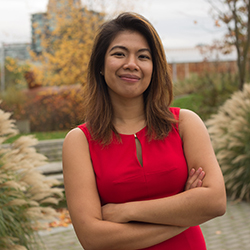Tweeting the revolution
The politics of change intrigue Aim Sinpeng ’05

She sees similar stories of change unfolding across the developing world — be it the Arab Spring in the Middle East or unrest in Hong Kong, Korea and China.
And the threat of homegrown terrorism is rising. In Australia, where Sinpeng teaches politics at the University of Sydney, a radicalized gunman held 17 people hostage at a chocolate shop in mid-December.
The politics, theories and mechanics of those changes intrigue Sinpeng. She knows what’s in the balance. “I understand repression and losing freedom. I’ve lived it,” Sinpeng said. “I appreciate the bravery of protestors in highly repressive regimes.”
In addition to teaching, Sinpeng writes frequently (www.aimsinpeng.com) and is a prolific user of the social media platform Twitter (@aimsinpeng). She also is a regular commentator in media outlets that include the Washington Post, CBC News, the Globe and Mail, and Channel News Asia.
Her main research areas include democracy, regime transition, social movements and digital politics, with a regional focus on Southeast Asia.
She’s curious: What do people want? Why? How do they get organized? How do they communicate? How do they navigate an oppressive system to make their demands?
Increasingly, Sinpeng has found that the answer is social media. Today, platforms like Twitter and Facebook are helping protestors communicate and navigate the political landscape.
“People have more opportunities to voice their grievances and demands than ever before,” Sinpeng said. “Many people now live in cyberspace. They work, they go to school, do their shopping — all online. The Internet and smartphones have reduced the cost of activism drastically. Someone can literally launch a campaign for a cause at the click of a button.”
That technology has forever changed the world on an unprecedented scale, Sinpeng said. She predicts that as more people — especially in developing nations — go online, they will further reshape politics locally and globally, sometimes for the better and sometimes not.
Growing up in Thailand, Sinpeng became interested in global politics at a young age. Her interest sharpened during her teens, when she was a Davis United World College Scholar. The Davis program is designed to advance international understanding through education, and scholars from around the world are selected to study together in one of 14 locations on five continents. Sinpeng represented Thailand at the United World College of the American West in New Mexico, where she studied with students from 180 countries around the world.
At Connecticut College, where Sinpeng was a scholar in the Toor Cummings Center for International Studies and the Liberal Arts, her professors taught her how to pursue that interest through research and teaching. Eva Eckert, professor of Slavic studies, introduced Sinpeng to central European culture and history and sparked a secondary passion in Czech language; John Tian, associate professor of government, made politics insightful and fun; Rolf Jensen, professor of economics, encouraged her questions about global economic development.
Sinpeng said the staff also influenced her. Associate Dean for Community Learning Tracee Reiser taught her the value of compassion and giving back through community service, and Bev Matias at the Roth Writing Center spent hours helping Sinpeng improve her English. The staff who assist international students also were invaluable in making the adjustment to college life, Sinpeng said.
Sinpeng went on to earn her Ph.D. in political science from the University of British Columbia in 2013 and was a postdoctoral fellow at McGill University in 2014. Along the way, she consulted for the World Bank, the government of Thailand, several nongovernmental organizations and an investment bank, using her expertise in risk assessment and policy analysis.
Sinpeng has lived on four continents and said the experience taught her the value of tolerance, open-mindedness and kindness. “I won’t live in a place that is not diverse anymore,” she said.
“When I was at Connecticut College, I had a dream that I could change the world for the better. Living in a multicultural place and internationally has made that dream come alive.”